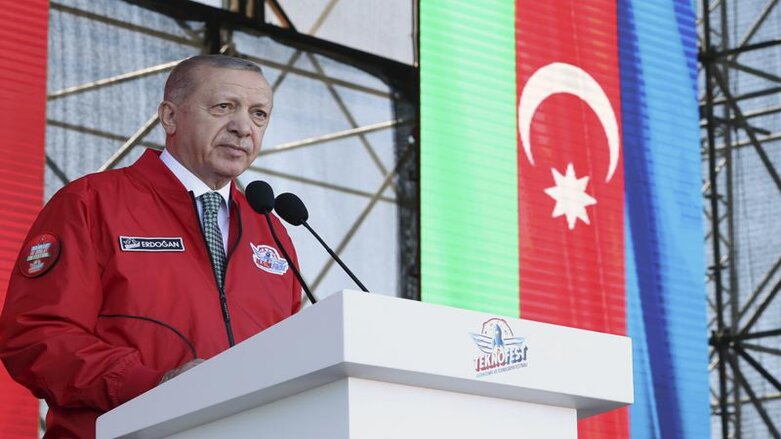US warns Turkey again about attacking northern Syria
Price specifically called on Turkey "to live up to the October 2019 joint statement, including to halt offensive operations in northeastern Syria."

WASHINGTON DC (Kurdistan 24) – For the second time in as many weeks, State Department Spokesperson Ned Price warned Ankara against a cross-border attack into Syria, including the area held by the Kurdish-led Syrian Democratic Forces (SDF).
Price's warning followed comments made by Turkish President Recep Tayyip Erdogan to Turkish journalists accompanying him on his return from a visit to Azerbaijan on Saturday.
According to several reports in the Turkish press on Sunday, Erdogan said he "would launch a cross-border operation against the Syrian Kurdish People's Protection Units, or YPG," the Associated Press reported.
The YPG forms the core of the US-led coalition's leading partner in Syria in the fight against ISIS, the SDF. But Turkey sees the YPG as the Syrian branch of the Kurdistan Workers' Party (PKK).
"Like I always say, we'll come down on them suddenly one night," Erdogan told reporters traveling with him on Saturday, "and we must."
Asked on Tuesday about Erdogan's statement, Price repeated his earlier criticism, "We said this last week, when this proposal was first raised, but we remain deeply concerned about discussions of potential increased military activity in northern Syria."
Read More: US' deeply concerned' over Turkish threats to Rojava, as Erdogan seeks to exploit Ukraine crisis
Price called on "all sides to maintain and respect ceasefire zones," while he affirmed, "We believe that any effort to do otherwise could be counterproductive" to our efforts to resolve "the broader conflict in Syria," but also the tremendous progress that we've made together, including with our Kurdish partners in the effort against ISIS that has achieved such important steps in recent years."
Price specifically called on Turkey "to live up to the October 2019 joint statement, including to halt offensive operations in northeastern Syria."
"We recognize Turkey's legitimate security concerns on its border," Price continued, but "we are concerned that any new offensive would further undermine regional stability and put at risk those hard-won gains in the campaign against ISIS."
Not only was Price repeating what he had said the week before, but he was also repeating what National Security Advisor Jake Sullivan had told Dr. Ibrahim Kalin, Erdogan's Spokesperson and Chief Advisor, on Saturday.
Ukraine was the focus of their discussion, but Sullivan "also reiterated" to Kalin "the importance of refraining from escalation in Syria to preserve existing ceasefire lines and avoid any further destabilization," according to a White House read-out of their conversation.
Russia's Position?
Erdogan spoke with Russian President Vladimir Putin on Monday, as AP reported in a story entitled, "Erdogan discusses Turkey's Syria incursion plans with Putin."
The report, datelined Istanbul, observed that Erdogan "in recent days" has said that Turkey would carry out a cross-border operation "against Kurdish militants in Syria to create a 30 kilometer-deep buffer zone."
Erdogan complained to Putin on Monday that "the frontier zone was agreed to in 2019, but had not been implemented," AP reported.
The two leaders also discussed the Ukraine crisis, with Erdogan offering to act as an intermediary between Moscow and Kiev. On Tuesday, the following day, Turkish Foreign Minister Mevlut Cavusoglu announced that his Russian counterpart Sergei Lavrov would visit Ankara next Wednesday.
The main purpose of Lavrov's visit will be to discuss a sea corridor for Ukraine to export its agricultural products, which are now bottled up in the Black Sea. That includes over 20 million tons of grain, according to Ukraine's agriculture minister.
While Ukraine will be the focus of those talks, the two foreign ministers are also likely to discuss the situation in Syria.
The US position that Turkey should not attack Syria is clear, but the Russian position is not. Nor is it clear what Erdogan intends to do now that he and Kalin have spoken with senior US and Russian officials.
On Tuesday, Turkish Defense Minister Hulusi Akar reiterated Turkey's determination to conduct a cross-border assault on northern Syria while visiting the United Arab Emirates.
"Due to the current situation, we see that we have to make some interventions to protect our country," Akar said. "We will continue our fight until the last terrorist is neutralized."
But it is also possible that the high-level discussions with Washington and Moscow have persuaded Erdogan not to attack, at least for now.
Indeed, that is the view of the Syriac Military Council (SMC), which is part of the SDF. SMC Spokesman Matai Hanna described Turkish escalation in northeast Syria, North Press reported.
Turkish forces have increased their shelling "in the northern countryside of Aleppo and in the town of Tel Tamer, north of Hasakah," North Press said, while Turkey's attacks have caused "great destruction to the Assyrian Church in the town of Tel Tawil," along with damage to schools, homes, and other facilities.
Hanna, however, attributed the Turkish assaults to its "failure to obtain a green light" for any new military operation. Two days ago, Ankara postponed its planned military operation "indefinitely," Hannah said.
Still, he held Moscow "responsible for the Turkish attacks," saying, "The Russian guarantor [of the 2019 ceasefire] does not take a serious attitude to stop the violations and war crimes committed by Turkey."